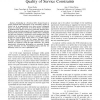Free Online Productivity Tools
i2Speak
i2Symbol
i2OCR
iTex2Img
iWeb2Print
iWeb2Shot
i2Type
iPdf2Split
iPdf2Merge
i2Bopomofo
i2Arabic
i2Style
i2Image
i2PDF
iLatex2Rtf
Sci2ools
86
Voted
ICC
2007
IEEE
2007
IEEE
Robust Multibeam Opportunistic Schemes Under Quality of Service Constraints
— Scheduling in a Broadcast (BC) channel based on partial Channel State Information at the Transmitter (CSIT) is carried out in an opportunistic way, where several orthogonal beams are randomly generated at the Base Station transmitter to simultaneously deliver several users with their intended data. Within a more practical perspective of the opportunistic systems, this paper first presents a transmission scheme where a minimum rate per user restriction is required for each scheduled user. This minimum rate is demanded by each user to properly decode and manage its received signal, which stands as a possible Quality of Service (QoS) indicator for the system behaviour. Then, the paper considers an imperfect CSIT situation where robust schemes are required to meet the QoS restrictions. Two robust opportunistic transmission philosophies are presented through a power allocation over the transmitting beams, and they are efficiently solved via convex optimization tools.
Related Content
| Added | 02 Jun 2010 |
| Updated | 02 Jun 2010 |
| Type | Conference |
| Year | 2007 |
| Where | ICC |
| Authors | Nizar Zorba, Ana I. Pérez-Neira |
Comments (0)

